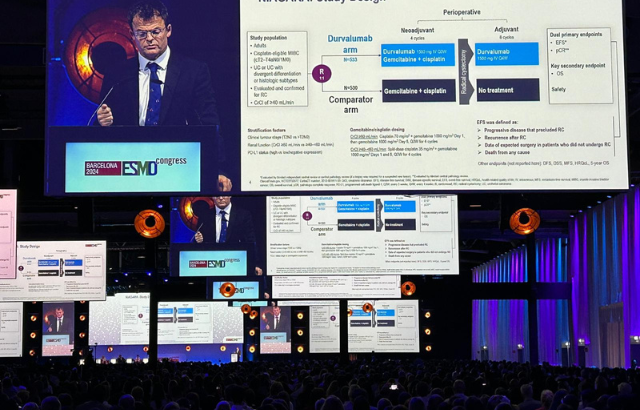This is the fifth time in recent years that researchers from Queen Mary University of London have been invited to deliver their findings at the prestigious Presidential Symposium, which is reserved for presentations on the most cutting-edge, clinical practice-changing studies. This is testament to the University’s research excellence, for which they are ranked 14th in the world.
The results of both trials, published in the New England Journal of Medicine (NEJM), show that innovative chemotherapy-immunotherapy drug combinations improve survival in two aggressive, hard-to-treat cancers: triple-negative breast cancer (TNBC) and muscle-invasive bladder cancer.
Professor Peter Schmid shared results from the Phase III KEYNOTE-522 trial which involved 1,174 patients from 21 countries. He showed that giving patients with high-risk early-stage triple-negative breast cancer the immunotherapy drug pembrolizumab before and after surgery in combination with chemotherapy reduces the risk of their cancer coming back and improves overall survival.
Speaking on the results, Professor Schmid said: “Triple-negative breast cancer has the worst outcomes compared to other types of breast cancer. The results of this trial have found a much-needed new way to treat this aggressive type of breast cancer, and the treatment regime has already become the new standard of care for these patients.”
In the same session, Professor Thomas Powles, who in 2023 was named in Nature’s list of 10 most influential people and in 2024 was listed in Time magazine’s 100 most influential people in global health, shared results from the phase three NIAGARA study. His trial, which spanned 22 countries and involved over 1,000 patients, showed that combining the immunotherapy drug durvalumab with chemotherapy improves survival in people with muscle-invasive bladder cancer.
Professor Powles says: “Treating aggressive bladder cancer before it spreads is perhaps our best chance of a cure. In NIAGARA, we show for the first time that the addition of immune therapy to chemotherapy increases this cure rate. This is a major step forward for these patients.”
Both researchers lead teams at Queen Mary’s Barts Cancer Institute and Barts NHS Health Trust, which together form the Barts Experimental Cancer Medicine Centre (ECMC), one of the largest cancer trial centres in the UK and a recognised immunotherapy centre of research excellence.
Sign up to our QM Connect Newsletter



